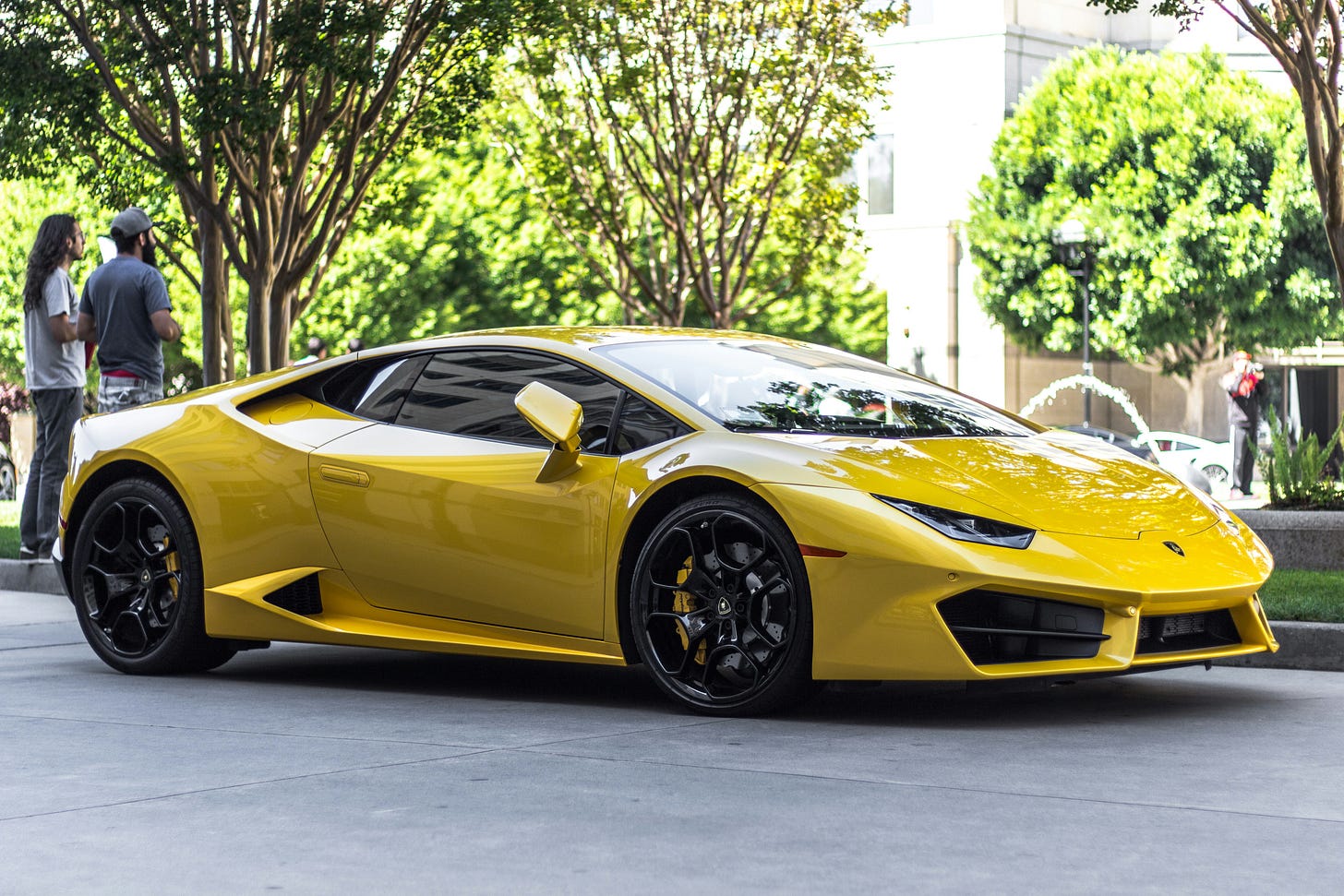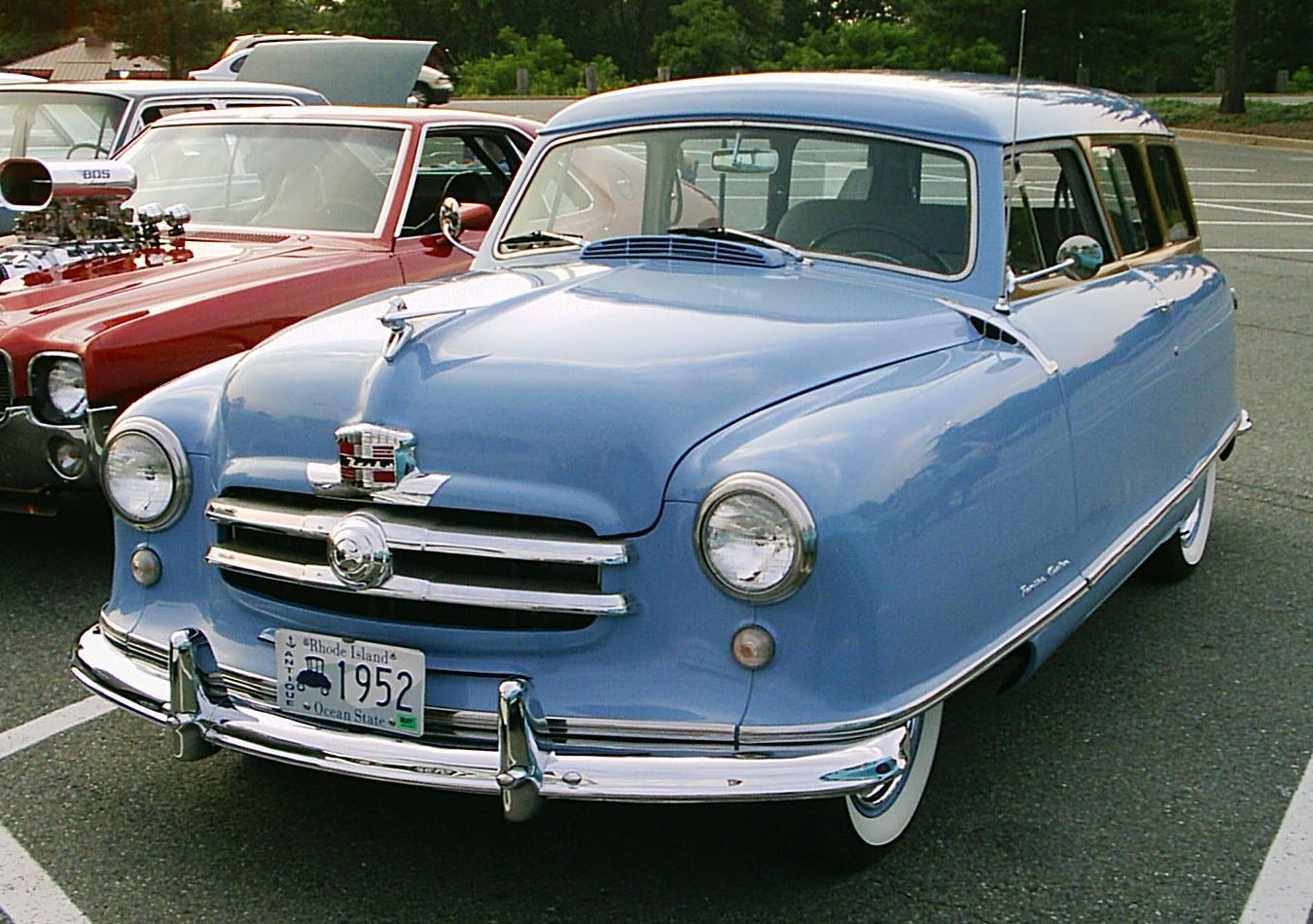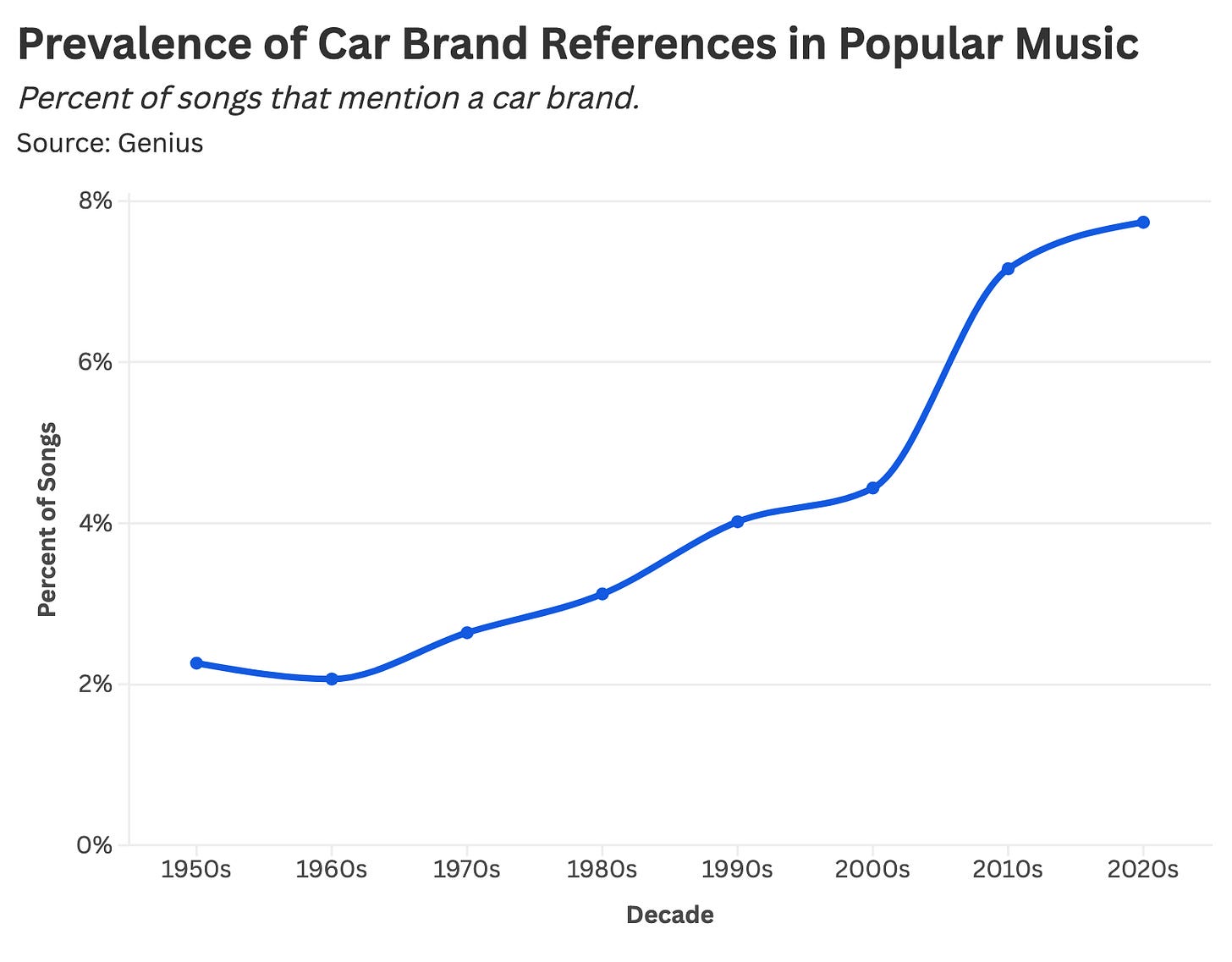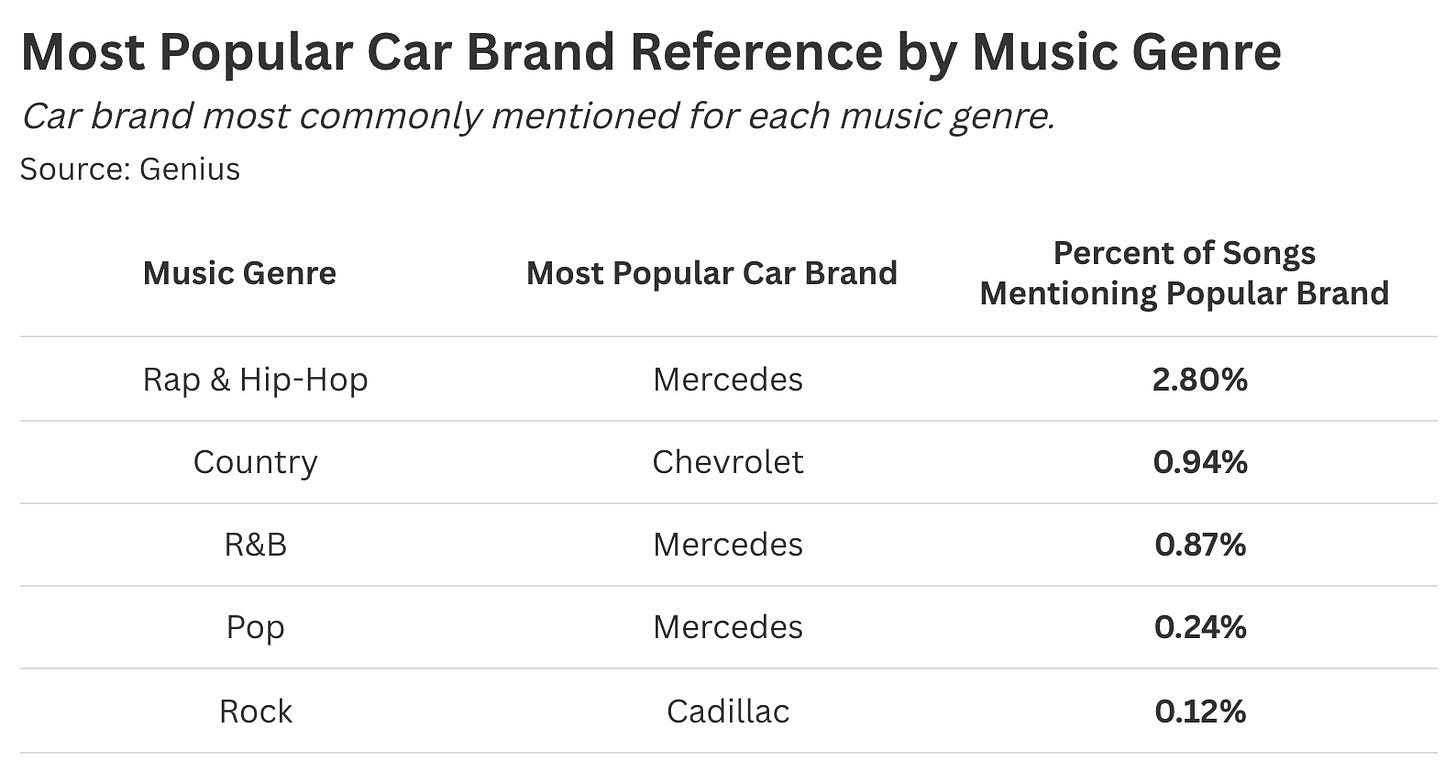Which Car Brands are Frequently Featured in Popular Music? A Statistical Analysis
Which car brands are a fixture of song lyrics?
Intro: "Beep Beep" and Brand Promotion
The first Billboard-charting track to mention a car brand was "Beep Beep" by The Playmates, released in 1958. This novelty song humorously narrates a race between a Cadillac and Nash Rambler (the first American compact car), explicitly naming both brands throughout the song. Listeners dug this car-centric retelling of the tortoise and the hare, leading "Beep Beep" to peak at number four on the Billboard charts.
Because brand promotion was a then-novel (and surprisingly taboo) concept, many radio stations refused to play "Beep Beep." Consequently, The Playmates had to re-record an alternative version of the song to comply with a BBC directive barring consumer brand mentions, replacing "Cadillac" and "Nash Rambler" with generic terms like "limousine" and "bubble car."
Beep Beep's inadvertent brand promotion brought widespread attention to the Nash Rambler, highlighting its surprisingly strong performance for a compact car. The Rambler experienced record-breaking sales in the aftermath of Beep Beep's release, forcing the American Motors Corporation to double annual production. By invoking the Nash Rambler as narrative shorthand for "fast," the tune spurred consumer interest in this unexpectedly speedy car.
Car brands have remained a persistent staple of popular music since the days of "Beep Beep" and the Nash Rambler, adding depth to song storytelling and communicating status through brand association. Invoking a car manufacturer like Chevrolet or Mercedes can serve various songwriting functions, with the symbolic resonance of these reference points shifting over time.
So today, we'll examine popular music's ever-evolving relationship with car brands, spotlight which reference points have risen or declined in prominence, and explore how these cultural touchstones differ by music genre.
Which Car Brands Are Frequently Featured in Popular Music?
Because the average song lasts only three and a half minutes—a relatively short span—songwriters often rely on recognizable brands as convenient storytelling shorthand. Across eight decades of popular music, certain goods have emerged as common reference points:
Fashion: Gucci, Versace, Tom Ford, Wrangler
Alcohol: Patrón, Grey Goose, Budweiser
Automobiles: Mercedes, Ford, Cadillac
Once explicitly banned by certain radio stations, car brand mentions have become a mainstay of modern music, with references to automakers appearing in ~8% of all Billboard-charting songs.
Roughly speaking, automaker mentions can be grouped into three broad categories:
Storied Luxury Brands: Elite products that typically convey high status.
American Mid-Market Brands: Widely accessible vehicles that cater to a range of tastes.
Global Brands Introduced to English-Speaking Markets in the 1980s and 1990s: These automakers experienced a modest rise in recognition as the global car market expanded, beginning in the late 1980s and early 1990s. I'm not going to cover these brands in great detail, so here are a few examples: Kia, Audi, Toyota, and Honda.
We'll start by examining storied luxury brands: high-end foreign imports (from an American or British perspective) that have become enduring icons of conspicuous consumption.
Mercedes is the most frequently referenced car brand by orders of magnitude, followed by Lamborghini and Bentley.
Mercedes has been mentioned in roughly ~1.6% of all songs in the 2020s, which is a curious result for a high-end brand that is expensive but not too expensive (when compared to McLaren or Ferrari). My best guess is that a Mercedes is an attainable luxury car, whereas seeing a McLaren is like glimpsing a shooting star. It's conceivable that someone could make a good investment, earn a lot of money, and buy a Mercedes (but not a Lamborghini).
Tesla—a totally normal brand that absolutely everyone loves and agrees on—has seen a notable surge in song mentions in recent years. It's anyone's guess how these figures will change over the next few decades.
Apart from Tesla, every luxury brand in this group dates back to the early 20th century, making their increased notoriety all the more remarkable. How has the cultural context surrounding these automakers shifted so dramatically? Why did everyone start singing about these brands in the 2000s? We'll return to these questions in a bit, but first, let's examine the manufacturers whose song mentions have waned.
The criteria for car brands experiencing declining song references are highly specific:
Widely Available Since the 1960s–1970s: These manufacturers must have been well-established in English-speaking markets for decades.
Frequently Mentioned in Mainstream Music (At One Time): These companies once regularly appeared in popular songs.
Recent Decline in Mentions: Mentions of these brands have tapered off in recent years.
Our group of lesser-referenced brands consists of American manufacturers based in the Detroit metro area, such as Cadillac, Ford, and Chevrolet. These automakers primarily serve middle-class tastes and lack the cachet of pricier imports.
That said, the perceived accessibility of Ford and Chevrolet can (paradoxically) function as a status symbol within groups that reject conspicuous consumption. This is where genre comes into play: the interaction between brand affinity and musical style reveals a fascinating intersection of cultural signaling, economic striving, and class.
Enjoying the article thus far and want more data-centric pop culture content?
Car Brands and Music Genre: Who Favors What?
Since the genre's emergence in the late 1970s, rap artists have frequently referenced luxury cars as symbols of success and upward mobility, reflecting hip-hop's origins in marginalized communities striving for economic and social progress. Early examples include The Sugarhill Gang's "Rapper's Delight," which name-checks a Lincoln Continental, and The Furious Five referencing a Rolls-Royce in "Superrappin'."
Status symbols like Mercedes and Bentley align with hip-hop's emphasis on self-expression and individuality, signifying triumph over socioeconomic adversity. Consequently, car brands have remained a persistent fixture of rap and hip-hop, appearing in nearly 13% of popular rap tracks.
Rap's burgeoning cultural dominance has been instrumental to the growing volume of car references in popular music, especially for luxury brands like Mercedes and Lamborghini.
Country music ranks second in total car references, though brand mentions occur in only ~5% of songs—well below that of rap. Having never heard a Ferrari or Bentley name-checked in a country tune, I grew curious about which brands are recurring staples of a given genre.
Among the five most common music formats, Mercedes is frequently mentioned in pop, rap, and R&B, Chevrolet is a fixture of country music, and Cadillac is commonly referenced in rock.
Pickup trucks dominate car references in country music, with Chevrolet models—particularly the Silverado—being the most frequently mentioned. Chevrolet's accessible, working-class appeal and the rhyme-friendly "Chevy" nickname align more naturally with country music's cultural themes.
To better understand this phenomenon, I also reviewed the second most frequently mentioned brand across these genres and found that Lamborghini is heavily name-checked in rap and R&B, while Ford is a country music mainstay (particularly the Ford F-150 pickup truck).
Each genre's preferred car brand represents something aspirational: Ford and Chevrolet evoke country music's humble blue-collar ethos, while rap's infatuation with Lamborghini and Mercedes embodies a pursuit of economic mobility and empowerment.
This leads me to my final (unanswerable) question: how many affluent country stars drive a "Chevy" or Ford F-150? There's a deeply ingrained American belief that if you have the money, you should spend it—because that's freedom at its best. So, do country stars like Tim McGraw and Luke Bryan drive a Lamborghini or a Chevrolet Silverado? I'm not trying to be a pest; I'm genuinely curious!
Final Thoughts: Consider The Lamborghini

I live in Los Angeles, a city dominated by car culture. Due to the sheer number of vehicles in this metro area, a thriving valet industry has emerged, with countless restaurants, office buildings, and comedy clubs providing valet service. I've long contended that certain people live for these valet handoffs—savoring the moment when they toss their Bentley or Ferrari keys to a service professional before strolling into an overpriced restaurant. Deep down, I've always considered myself "better" than these vainglorious types, given that my appetite for status-driven purchases is comparatively modest. Then, it came time for me to buy a new car.
I have never been a "car guy." Before needing a vehicle, I'd never done a shred of automobile research. As we began our car-buying journey, I was shocked to discover my deep-seated reaction to certain automobile brands, despite knowing almost nothing about them. My wife would make a suggestion, and I would scoff with self-righteous indignation, "Is that who we're looking to be?"
After five minutes of my uninformed hot takes, my wife asked a mildly ego-shattering question: "Why do you have such strong feelings about these cars?"
It was at this moment that I realized a few things:
Status matters—even when it's the driving force behind not purchasing something.
Whenever I think I'm "better" than a (hypothetical) status-obsessed Ferrari owner, I'm simply a hypocrite who is equally preoccupied with status.
My views on car ownership are heavily informed by cultural cues, with depictions in popular media and the opinions of those around me shaping my understanding of the prototypical BMW or Mercedes owner.
We can learn a surprising amount about a car without ever conducting formal research. Consider the Lamborghini—an automotive brand that enjoys near-mythical status relative to its existence in the physical world. I don't know anyone who owns a Lamborghini, I have never seen an ad for this car brand, and I can't tell you why this automaker is so special. At the same time, I know that Lamborghini makes expensive luxury cars exclusively owned by high-status individuals—and I've somehow harbored these views from an early age. How is this possible?
Ultimately, my beliefs on Lamborghinis have been absorbed through cultural osmosis. To crib from David Foster Wallace's "This is Water" speech, I have been living in a fishbowl of Lamborghini worship, unaware of Big Lamborghini's hold on popular culture.
Arguably, no form of advertising is more potent than a prominent showcase in music or film. In these moments, we lower our guard, assuming we're not being marketed to at all. A catchy tune or propulsive blockbuster can seed our collective fascination with Mercedes, Chevys, Lamborghinis, and, of course, the inimitable Nash Rambler.
Struggling With a Data Problem? Stat Significant Can Help!
Having trouble extracting insights from your data? Need assistance on a data or research project? Well, you’re in luck because Stat Significant offers data consulting services and can help with:
Insights: Unlock actionable insights from your data with customized analyses that drive strategic growth and help you make informed decisions.
Dashboard-Building: Transform your data into clear, compelling dashboards that deliver real-time insights.
Data Architecture: Make your existing data usable through extraction, cleaning, transformation, and the creation of data pipelines.
Want to chat? Drop me an email at daniel@statsignificant.com, connect with me on LinkedIn, reply to this email, or book a free data consultation at the link below.
Want to chat about data and statistics? Have an interesting data project? Looking to produce data-centric editorial content? Email daniel@statsignificant.com











Maybe I'm unusual, but I dread valet service. It feels like an extra hassle and I don't like randos driving my car.
Though a small part of the reason is financial. I don't like having to tip the valet, including worrying about the proper amount to tip.
1.6% of ALL songs! That’s incredible.